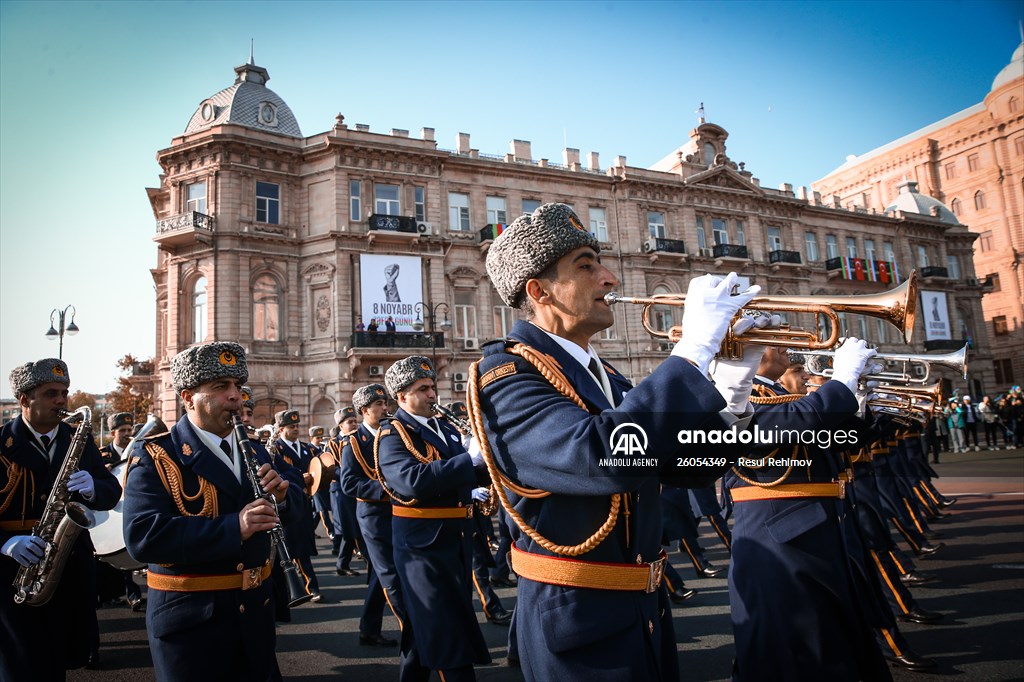Museyib SHIRALIYEV
8th November marks one year since the Karabakh Victory. Over the past year, Azerbaijan has achieved historic success both on the battlefield and in the diplomatic sphere. During the counter-offensive operations of the Azerbaijani Army in response to the provocations of Armenia since September 27, the enemy was dealt a crushing blow, and a large number of personnel and equipment of the occupiers were destroyed.
During the battles, Sugovushan village and Hadrut settlement, which were of other strategic importance for Azerbaijan, were also liberated from Armenian occupation. After the liberation of Sugovushan village, water was released from the Sugovushan reservoir. Thus, the water problem of several regions has been solved and the ecological balance is ensured by supplying water to Tartar, Goranboy and Yevlakh regions.
With the liberation of the Agband settlement of Zangilan on October 22, Azerbaijan has fully restored the state border with Iran. This historic event can be assessed as another strategic victory in ensuring the territorial integrity and sovereignty of Azerbaijan. It is important to take full control of our state border with Iran. This put an end to drug smuggling and other illegal activities carried out by Armenians over Nagorno-Karabakh for years.
The United States activation
US Secretary of State Mike Pompeo stressed the importance of ending violence and protecting civilians at a meeting of foreign ministers in Washington on October 23. He also stressed the importance of the parties’ participation in substantive talks mediated by the OSCE Minsk Group co-chairs in order to resolve the conflict on the basis of the principles of the Helsinki Final Act non-violence, territorial integrity, equal rights and self-determination of peoples.
According to analysts, the fact that the United States has played a passive role despite being the co-chair of the OSCE Minsk Group since the outbreak of the war in Nagorno-Karabakh shows that no progress should be expected from the “Washington meeting”. The absence of the Azerbaijani and Armenian foreign ministers in the trilateral meeting was also a sign that the US leadership did not have high hopes to close the gap in the positions of the warring parties. In addition, the Washington meeting may be due to two factors:
The first factor may be the desire of the United States to compensate for the inaction of the Minsk Group as a co-chair country in response to the Moscow meeting.
As a second factor, it should be noted that Washington’s efforts to end the war could be considered a calculated step in domestic policy. Because, the main goal in this issue could be to get the support of the Armenian voters and lobby, given the presidential elections in the United States at that time. The second factor could be Joe Biden’s in-depth knowledge of Karabakh. His statements also gave grounds to say so.
Azerbaijan’s Karabakh victory
As a result of the Second Karabakh War, which lasted 44 days, the victorious Azerbaijani Army liberated a number of strategic heights, including 4 cities (Jabrayil, Fuzuli, Zangilan and Gubadli), 3 settlements (Hadrut, Minjivan and Agband), 165 villages and Murovdagh peak. Also, the Khudaferin Bridge, which is of great strategic importance and moral value for Azerbaijan, has been liberated.
Azerbaijan’s military victories, especially the liberation of Shusha from enemy captivity on November 8, played a decisive role in the fate of the war. November 10, 2020 resulted in Armenia’s recognition and capitulation of its defeat, forcing Armenia to return the Kalbajar, Agdam and Lachin regions to the Republic of Azerbaijan.
The victory of Azerbaijan in the Second Karabakh War, which led to the formation of a new political reality in the region in the XXI century, expressed interest in creating new mechanisms of cooperation in the region, which created a favorable opportunity for Great Powers to change their approach to the region.
Also, on the first anniversary of the end of the war, the roles of Moscow and Ankara in the geopolitical games in the region are analyzed. It is believed that both countries have strengthened their military and diplomatic positions in one way or another after the war. This is explained by Russia’s presence in Karabakh as a peacekeeping force, while Turkey is represented in a joint Russian-Turkish monitoring center and has closer ties with Azerbaijan.

